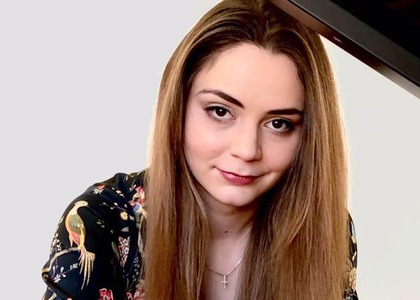> [Archived] Interviews

Interview with the pianist Daria Tudor
"Violin in Love" is the name of the recital offered by the violinist Valentin Șerban together with the pianist Daria Tudor. You can see them perform at the Radio Hall, on the 12th of February, starting with 6 pm. We'll get more details from the young pianist herself, in an interview done by Ioana Țintea.
Daria Tudor, on the 12th of February you'll be holding a recital, together with the violinist Valentin Șerban. What are your thoughts now that you're coming back on the stage of the Radio Hall?
It is with great joy that I return to the stage of the Radio Hall. This time I will be joined by Valentin Șerban for the first time, a collaboration that both us, I believe, have been looking forward to for a long time. Here it is, it's happening now, with a repertoire that we can't wait to present to you.
This event's title is "Violin in Love". How is the chosen title reflected in the program you'll be presenting to the public?
We have plans to record an album in the future. It will feature works by Robert Schumann, Clara Schumann and Johannes Brahms.As the repertoire planned for the album is slightly longer than what a live concert allows, Brahms is no longer featured in our program, Beethoven is, but that does not mean that "Violin in Love" is not reflected in the program you will be hearing on the 12th of February, that is because Robert Schumann and Clara Schumann, as theirs names suggest, share an undeniable love. As for Beethoven, "Sonata No. 4" is, for me, an extremely special piece, it is one of his early works and one of the first violin sonatas to be praised. It is much shorter, but the second part is of unmatched delicacy, it almost has a sort ofMozartian purity to it, it's a work that reflects love, more than any other. It is naive, childish and genuine.
Robert Schumann's "Violin and Piano Sonata No. 2 in D minor" was written just a few years before his death, during an emotionally sensitive time. How is this experience reflected in his piano writings?
It is difficult to talk about Robert Schumann. But I am very glad that Vali proposed this piece, because, for me, Schumann was the composer I always wanted to perform, but whose pieces were almost forbidden, because I was afraid.Schumann is a unique composer, he is a pianist and he writes pianistically, and I was happy to hear from Valentin that he sees in his writing for the violin something playable, something close to bel canto. The Sonata, a late opus, not the last, but a very late opus, reflects the double personality, with Florestan and Eusebius, the inner characters we all know of Robert Schumann.It is an almost sickening turmoil of emotions, filled with pure moments, delicate to the point of tears.
The recital at the Radio Hall is taking place with support from The Heirs of Musical Romania and it is the first event held in collaboration with ARTEXIM, marking the start of a series dedicated to young Romanian singers, laureates of the George Enescu International Festival. How do you, as a semifinalist of the George Enescu International Festival, see the involvement of ARTEXIM in the project The Heirs of Musical Romania?
For me, The Heirs of Musical Romania project itself is an honor and a source of happiness, because it opens many doors for us, young people. Therefore, more opportunities and more people supporting this mean an even greater happiness to us. So I can only thank ARTEXIM, Radio România Muzical and The Heirs of Musical Romania project for what has been happening for several good years and we, young people, hope that it will continue to happen on the stage of the Radio Hall and beyond, everywhere in the country.
Translated by Cristina-Bianca Ion,
University of Bucharest, Faculty of Foreign Languages and Literatures, MTTLC, year II
Corrected by Silvia Petrescu














